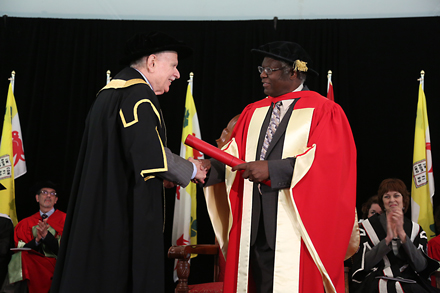
By Arnold Steinberg
Good morning (afternoon) graduates, honoured guest, ladies and gentlemen; Bonjour à tous,
Depuis être devenu chancelier, c’est par habitude que j’ouvre cette cérémonie avec de brèves réflexions et ce ne sera nullement différent aujourd’hui.
Eighteen years ago, Vaclav Havel gave the Commencement Address at Harvard University. Havel, a Czech playwright, essayist, poet and dissident was the ninth and last President of Czechoslovakia and immediately following became the first President of the Czech Republic. It was a brilliant address which lasted well over an hour and covered a number of important issues. This morning I want to focus on just one of those topics.
What Havel argued was that the main task of politicians is not to ingratiate themselves with the public through the popular decisions they take or their charisma on television. It is not to go on winning elections thus ensuring themselves a place in the sun until the end of their days. Politicians’ roles should be something quite different. It should be to set an example for the public on whose behalf they work. Their responsibility is to think ahead boldly and not to fear the disfavour of the crowd but to explain over and over–both to the public and their political colleagues as well as to opposition groups –that politics must do far more than reflect the interests of particular groups or lobbies. In Havel’s view, politics ought to be a matter of serving the larger community which, in effect, makes it morality in practice.
Like Vaclav Havel, I don’t believe that a politician who sets out on this seemingly risky path will inevitably jeopardize his or her political survival. This notion of political expediency wrongly assumes that the citizens are always short-sighted and that political success depends on playing to their myopia. That is a very shallow view of human nature and ignores the fact that a conscience slumbers in every human being. Clearly, it is sometimes more dormant than at other times, but it is in their intelligence and fundamental goodwill that we must place our trust.
What Vaclav Havel said eighteen years ago rings as true today as it did then. We should not blame the political system for being corrupt, indifferent and beyond our control. Fortunately, we live in a democracy as do most of you who are graduating today. It allows us to become involved in any manner we choose at whatever level to make things better. In this way each of us can help to ensure that the society in which we live is more than each of us pursuing our own selfish interests.
